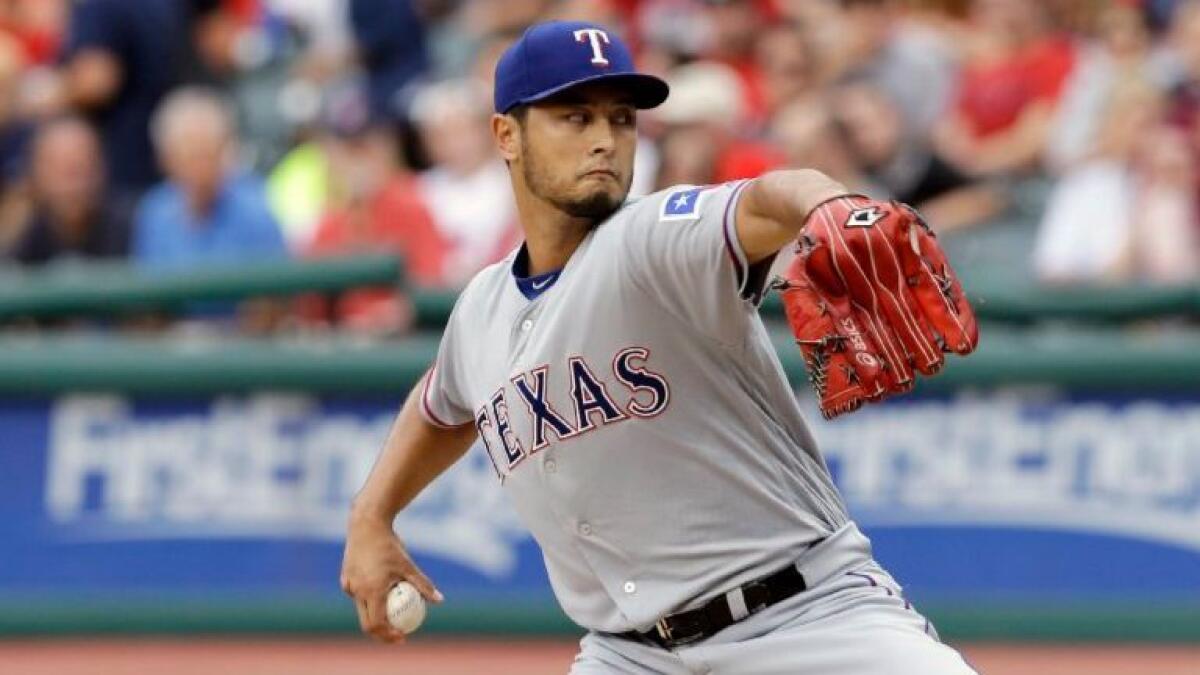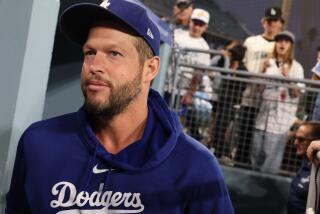Column: Trading for Yu Darvish is crucial for Dodgers with or without Clayton Kershaw

The Dodgers warned their fans in recent weeks they might not make a major addition before the July 31 nonwaiver trade deadline. The words and ideas shared by the front office pointed to the organization retaining its top prospects instead of trading them for reinforcements, as the team’s architects sounded as if they had their sights set on third and fourth championships when, in reality, they still hadn’t won their first.
If Andrew Friedman and his band of brainiacs had to be convinced to pay the premium to acquire a difference-making pitcher, the case to do so was presented to them Sunday when Clayton Kershaw retreated to the clubhouse in the middle of the second inning with what the Dodgers described as “tightness” on the right side of his lower back. The severity of Kershaw’s injury is unknown, but manager Dave Roberts said the best pitcher in baseball is expected to be put on the disabled list.
So, really, there’s no argument now: The Dodgers should trade for Yu Darvish, and if not Darvish, a pitcher of similar ability.
The Dodgers, who are known to be interested in the Texas Rangers right-hander, are an exceptionally strong team in an exceptionally weak league. With the Chicago Cubs and Washington Nationals looking like diminished versions of themselves, the road to the World Series remains as inviting as it has ever looked over the last three decades.
If Kershaw’s back problems are serious, the move would be a necessity. The other players on the team should be able to play out the season with a legitimate ace, which Darvish is. They have outperformed the loftiest of expectations and compiled the best record in baseball. They have earned this.
But the thinking shouldn’t change if Kershaw’s ailment is revealed to be minor or moderate. If anything, such a scenario should further incentivize the Dodgers to pursue a trade with the Rangers, as doing so could provide Kershaw with the kind of support he has lacked in recent postseasons.
Kershaw has pitched on three-days’ rest in each of the last four postseasons. This has become an annual occurrence, which has obscured the difficult and unusual nature of the task.
Kershaw shouldn’t have to pitch on such a schedule until the World Series, if at all. That becomes possible if Darvish is added to a rotation that includes Kershaw, Alex Wood and Rich Hill. With a well-rested Hill as the No. 4 starter, Kershaw would have the kind of flexibility that wouldn’t be afforded to him if the likes of Brandon McCarthy or Kenta Maeda are part of the postseason rotation. (There’s also the bonus of Darvish being a right-hander, who could present opponents with a significantly different look than Kershaw, Wood and Hill, who are all left-handed.)
Of course, pitching on short rest might not be an option. Kershaw sat out more than two months last season because of a herniated disk in his back, but timing was on his side. He was injured in June, which allowed him to return and pitch in September to ready himself for the playoffs. An absence of similar length this year would force Kershaw to enter the postseason with little to no preparation.
It’s not as if the Dodgers don’t have the resources to make a major trade. They are baseball’s wealthiest team, courtesy of a television contract that has made their games invisible to a majority of the market. They also have the player capital required to be players on the trade market, as they have one of the most talent-laden farm systems in the game.
Darvish will be a free agent at the end of the season. As a two- or three-month rental player, he would cost the Dodgers considerably less than a pitcher under club control for multiple seasons.
The Dodgers don’t want to trade top pitching prospect Walker Buehler? No problem. They shouldn’t have to send the Rangers their No. 1 prospect in exchange for Darvish.
But this isn’t some fantasy land. If the Dodgers want to land a pitcher of Darvish’s caliber, they will have to trade a prospect they prefer not to trade.
The Cubs had to trade elite prospect Gleyber Torres last season to acquire All-Star closer Aroldis Chapman. If they hadn’t won the World Series, they would be lamenting that trade today. On the other hand, if they hadn’t made that trade, they probably wouldn’t have won the World Series. It was a reminder that victory goes to the bold.
Whatever you think of the Dodgers front office, the group has shown a certain degree of courage by sticking to its plan of building for the future, even though doing so has drawn criticism from a large segment of the team’s fan base. It’s now time for the front office to display another kind of bravery, this time by temporarily breaking from its program. This situation calls for that.
Follow Dylan Hernandez on Twitter @dylanohernandez
More to Read
Are you a true-blue fan?
Get our Dodgers Dugout newsletter for insights, news and much more.
You may occasionally receive promotional content from the Los Angeles Times.







